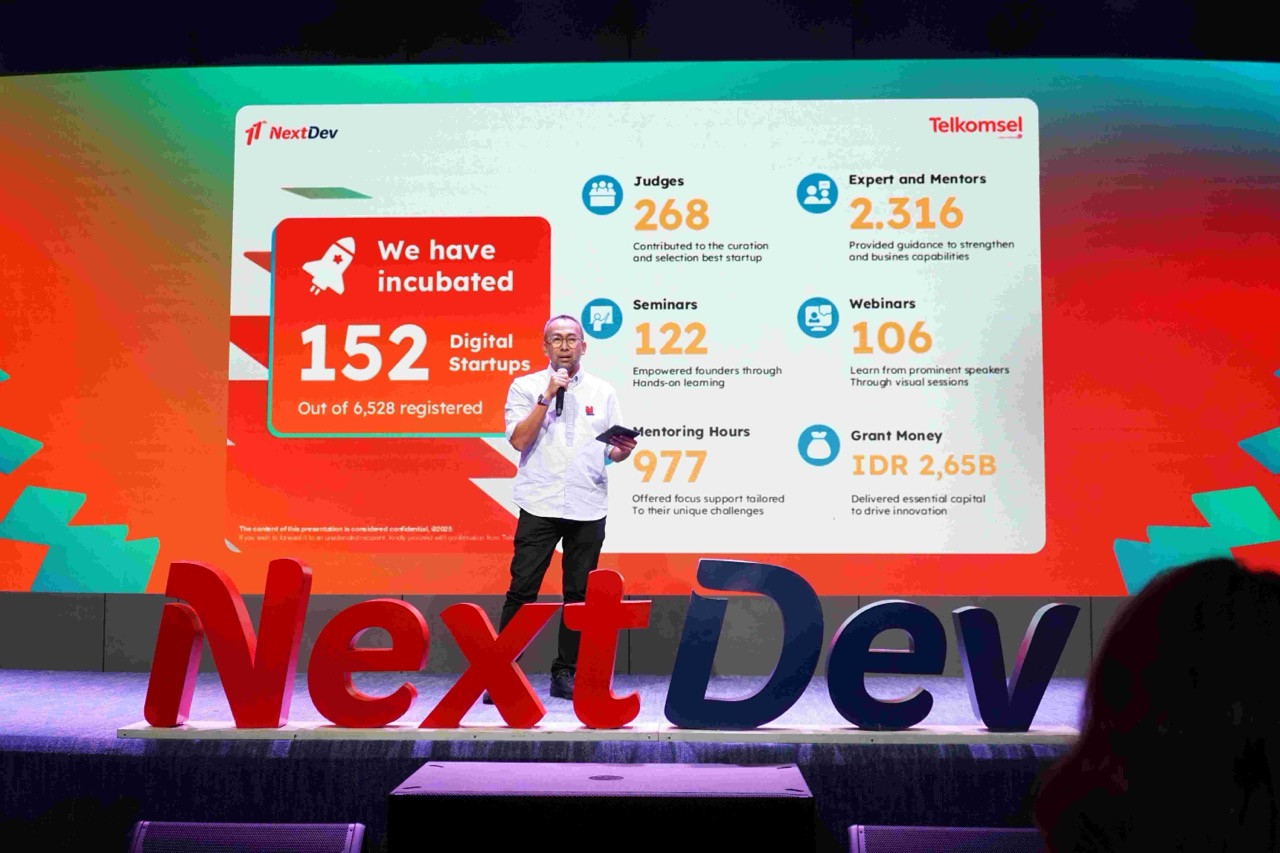Telkomsel’s long-running startup incubator NextDev has again captured attention by reporting the involvement of some 6,500 startups to date, with this year’s program sharpening its focus on AI-driven solutions. The scale of participation reflects both the maturation of Indonesia’s startup ecosystem and a deliberate pivot toward AI as the central theme for scouting, training and incubation.
NextDev Telkomsel has evolved from a general early-stage builder into a targeted NextDev AI program that prioritizes solutions leveraging machine learning, computer vision, natural language processing and other applied AI areas. This shift represents a pragmatic response to market demand: investors and corporates increasingly seek startups that can deliver AI-enabled impact across sectors such as education, health, agriculture and government services.
In this article I unpack how NextDev Telkomsel operates today, why the program matters for AI startups Indonesia-wide, what tangible benefits founders can expect, and how policymakers and ecosystem partners can maximize outcomes. The article uses practical examples and clear takeaways so founders, investors and ecosystem builders can act on insight rather than noise.
How NextDev Engages Startups and Builds AI Capacity
NextDev Telkomsel functions as an impact incubator and talent builder. The program mixes open scouting with academy-style training, mentoring, and access to Telkomsel’s distribution channels and corporate partnerships. By embedding AI into its curriculum and selection criteria, the NextDev AI program ensures early-stage teams are evaluated for technical feasibility, data readiness, and potential social impact, not only for product-market fit.
The approach is pragmatic: rather than generic acceleration, NextDev Telkomsel provides modular support that spans prototype validation, data strategy, ethics and governance for AI, and go-to-market pilots with Telkomsel business units. This structure reduces the time between proof of concept and real-world deployment, which is crucial for technopreneurs who must demonstrate measurable impact to attract follow-on funding.
Why Scale Matters: 6,500 Startups and Network Effects
The reported 6,500 startups figure is not just a vanity metric. At that scale, NextDev Telkomsel generates network effects that benefit founders and partners alike. A large candidate pool lets program managers surface niche innovations across geographies and verticals. More importantly, the cumulative alumni network creates peer learning and potential B2B partnerships between graduates. For funders, a broad funnel increases the quality of deal flow and accelerates discovery of commercially viable AI startups.
Startups that emerge from large, selective programs often carry a credibility premium when negotiating with corporates and investors. That premium is even more valuable for AI startups Indonesia-wide because enterprise customers frequently demand evidence of data governance, reproducibility of models, and clear ROI. These are areas that NextDev Telkomsel training consistently emphasizes.
What Startups Gain: Access, Expertise and Pilot Opportunities
Founders joining NextDev Telkomsel can expect three core advantages. First, access to Telkomsel’s customer base and distribution channels for pilots and paid trials. Second, technical mentorship that covers AI model selection, dataset curation, and evaluation metrics that translate into business outcomes. Third, investor readiness support that focuses on unit economics, regulatory compliance and governance frameworks for responsible AI. Together, these pillars help convert early technical experiments into repeatable commercial offerings.
Beyond product support, NextDev Telkomsel often links startups to specialized partners for cloud credits, research collaborations and domain mentors. This ecosystem scaffolding matters because many AI projects fail not from lack of algorithmic skill but from insufficient domain data and limited channels to test real users.
Challenges for AI Startups and How the Program Responds
AI startups Indonesia face distinct challenges. Data availability and quality remain persistent obstacles. Many social-sector datasets are incomplete or siloed, and privacy rules require careful navigation. Talent scarcity is another hurdle: recruiting ML engineers and data scientists remains expensive for early teams. Additionally, capital for long development cycles is harder to secure than for product-only startups.
NextDev Telkomsel attempts to address these issues by integrating data strategy modules into its academy and by fostering partnerships with institutions that can provide anonymized datasets for pilots. The program’s emphasis on technopreneurs development also targets talent pipelines through upskilling initiatives and collaborations with universities and vocational institutions.
Policy and Ecosystem Implications
For government and regional stakeholders, NextDev Telkomsel’s scale suggests a role for coordinated policy interventions. Data-sharing frameworks that preserve privacy while enabling innovation, incentives for R&D collaborations, and targeted grants for compute resources could significantly improve outcomes for AI startups Indonesia-wide. Programmatic support that complements private incubators reduces friction and ensures benefits extend to regional hubs beyond major cities.
Local governments can also partner with NextDev Telkomsel to pilot AI-driven public services. Data-driven interventions in urban planning, health outreach and agricultural advisory represent low-cost, high-impact domains where startups can showcase social value and scale regionally.
Practical Advice for Founders and Investors
For founders considering NextDev Telkomsel or similar accelerators, several key actions matter. Prepare a clear data strategy, define measurable KPIs for pilots, and create a narrow, repeatable use case for early customers. For investors, evaluate the program’s track record in generating follow-on funding and commercial pilot opportunities. Funders who collaborate with corporates to co-design pilot incentives increase the likelihood that startups transition into revenue-generating deployments.
For both founders and investors, remember that AI projects demand operational maturity. Investing in robust MLOps practices early reduces technical debt and accelerates delivery.
NextDev Telkomsel’s involvement of thousands of startups and its deliberate shift to an AI-first curriculum position it as a central catalyst for AI startups Indonesia. By combining scale with targeted technical support and corporate pilots, the NextDev AI program helps technopreneurs convert promising models into services that matter. Its ongoing effectiveness will depend on collaboration between industry, universities and regulators to ensure data access, talent development and sustainable funding for the long cycle of AI innovation.
If stakeholders continue strengthening these foundations, NextDev Telkomsel could become a decisive lever for Indonesia to build a native AI ecosystem that delivers economic and social value across the archipelago.
Read More






 Friday, 27-02-26
Friday, 27-02-26







